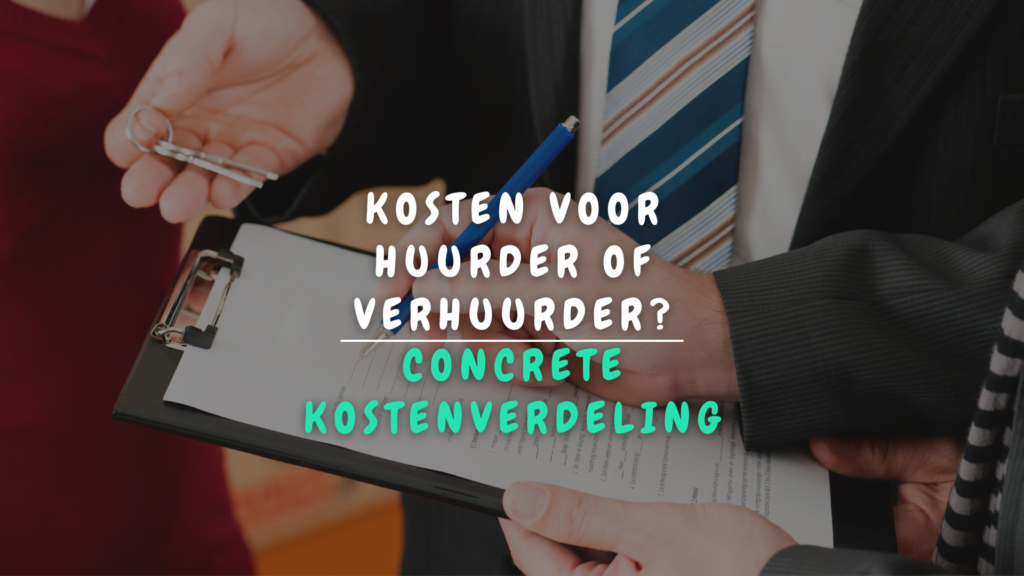Broken water heater? A facade that needs a lick of paint? If you rent a house, it is not always clear who has to pay what costs. Here is a handy overview of the costs for tenant or landlord.
General rules: Are costs for tenant or landlord?
Under Flemish law, this is the general breakdown of the costs you have to pay:
- As a landlord:
- you must deliver your apartment or house to the tenant in well-maintained condition.
- you must provide maintenance instructions from the manufacturer to the tenant for systems that require specific maintenance. E.g. boilers, home automation, heat pumps, etc.
- you are responsible for repairs of damage due to force majeure or wear and tear.
- As a tenant:
- you must (have) repairs done competently.
- you must report on repairs that are needed (reporting requirement).
- You will be responsible for minor maintenance and cleaning.
- You will be responsible for minor repairs limited to areas accessible by ladder.
When is it damage due to wear and tear or force majeure?
So how do you know what type of damage (wear and tear, force majeure or repair) it is? That depends on the place description that the tenant and landlord added together in the lease. Read more the placeholder description over in our article: What is a place description? Below is an overview of which costs are usually for the tenant or landlord. Note: According to the Residential Tenancy Act, you are free to specify in your lease which costs are for the tenant or landlord. So be sure to read your contract carefully.
Cost to the tenant
Below is a concrete non-exhaustive list of costs for the tenant as they appear in the Flemish Housing Decree. The tenant and landlord should fix all costs for the tenant in the rental contract. You can deviate from this list, but only to the benefit of the tenant. Note: The Flemish Housing Decree does not apply to contracts for trade, leases, offices, second homes and garages. As a tenant, you pay:
- water, fuel oil and natural gas consumption.
- electricity consumption in the common parts.
- the cost of garbage collection if organized collectively.
- replacing a defective bulb.
- replacing dead batteries in:
- smoke detectors in the common parts
- the bell
- the intercom or videophone
- garage door remote control
- the minor repairs to e.g.
- roller shutter ribbon repair.
- repair of broken locks.
- repair of leaking faucets.
- repair of a leaking toilet.
- repair of loose railing or balustrade.
- replacement of outlets.
- replacement of broken windows.
- replacement of defective fuse.
- replacement of light switches.
- replacement of the security system.
- replacement filter and bulbs of the fume hood.
- replacement of toilet pull cord and/or lever.
- minor maintenance e.g:
- lubrication of shutters.
- Periodic maintenance and cleaning of the central heating system.
- maintenance of painting and wallpaper.
- garden maintenance. You must prevent outdoor faucets from freezing to death.
- maintenance on gutters and drains. You need to prevent clogged drains.
- periodic sweeping of the chimney.
- periodic inspection of fire extinguishers.
- periodic inspection of the security system.
- descale shower heads, faucets, the dishwasher, washing machine, water heaters and boilers.
- remove lime scale in bathroom and kitchen.
- control of pests, unless they were already present at the start of the rental.
- prevent clogging of pipes and sewers: outside drain, roof drain pipe, sewers, siphons, toilet, sink, …
- pipe and sewer clogging troubleshooting (plumber or self): outside drain, roof drain pipe, sewers, siphons, toilet, sink, …
- the syndicate fee for the addition of an extra key for you as a tenant.
- fire insurance.

Cost to the landlord
Below is a non-exhaustive list of costs for the landlord. These are basically all costs not cited above – under costs to the tenant. As the landlord, you pay:
- property tax: The tax that applies in Belgium to real estate such as houses, apartments and land. The amount is calculated based on the cadastral income value of the property. You pay this annually to the government.
- Purchasing and replacing utility meters.
- the biggest costs on the elevator: risk analysis, preventive inspection, replacement of major parts, repairs and necessary modernizations.
- general meeting expenses.
- management and administrative costs.
- investment.
- reserve fund: The financial reserve established by the trustee for future costs of maintenance, repairs and renovations to the building.
- the trustee or broker’s fees for compiling a file when selling for you as a tenant.
- the major repairs to common parts and installations, except if they are broken due to the tenant’s misuse. E.g.:
- roof works (roof renovation).
- facade works (facade renovation).
- patio work (patio renovation, patio construction).
- installations (dishwashers, washing machines, boilers, boilers, toilet, shower, kitchen).
- the major maintenance works:
- gutter and tile maintenance.
- electrical installation modifications.
- the block policy: The insurance policy taken out by the trustee for the entire apartment building, and therefore also the common parts.

Shared costs
Whether costs are for tenant or landlord? Costs are not always just for one party. There are also shared or joint costs. The Flemish Housing Decree defines cost sharing for shared costs as follows:
- Elevator maintenance costs: lump-sum split of 50% for the tenant and 50% for the landlord.
- Trustee fees: flat 34% to tenant and 66% to landlord.
- The cost of the janitor: flat rate of 75% for the tenant and 25% for the landlord.

Would you like to cite this article as a source? Then use:
N. (2024, Nov. 22). Are costs for tenant or landlord: Who pays what? Apartment.com. Accessed on (date XX/XX/202X), from https://www.appartement.be/kosten-voor-huurder-of-verhuurder/
Related articles:

